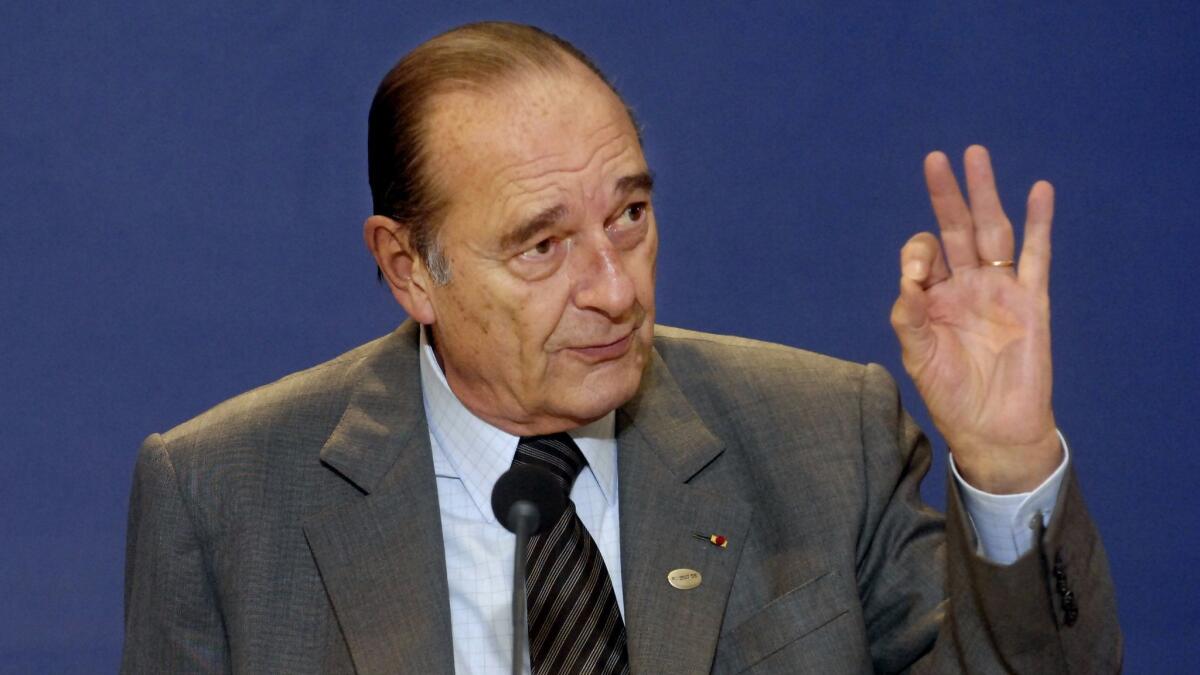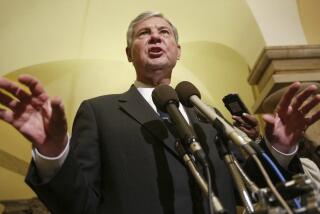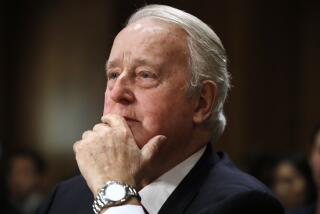Jacques Chirac, former French president and leading Iraq war opponent, dies at 86

Former French President Jacques Chirac, a gregarious and yet imperious political warhorse who during four decades in government became a senior European statesman and led opposition to the Iraq war, died Thursday. He was 86.
His son-in-law Frederic Salat-Baroux told the Associated Press that Chirac died “peacefully, among his loved ones.” He did not give a cause of death.
Chirac had an imposing physique and Gallic profile reminiscent of President Charles de Gaulle, whose center-right movement Chirac joined in the early 1960s. In the years afterward, he became a veritable political institution, but his roller-coaster career ended in decline and disappointment and he left office as one of the country’s most unpopular modern presidents, polls showed.
Elected to a second presidential term in 2002 with a resounding 82% of the vote, Chirac saw his popularity sink during a series of crises. In May 2005, he staked his future and the nation’s prestige on a proposed constitution for the European Union, but French voters defeated the initiative. Then he suffered a mild “vascular incident” that slowed him down and caused him to cede prominence to Prime Minister Dominique de Villepin, a longtime protégé and presidential hopeful.
Then in November 2005, France’s worst riots since the 1960s erupted after two North African teenagers from a suburban housing project were electrocuted while hiding from police in a power station. The three-week civil unrest inflicted $245 million in damage and gave a hollow ring to Chirac’s promise 10 years earlier to “close the social gulf.”
The president kept an unusually low profile during the unrest, reinforcing accusations that he had become a remote, faded figure. Sounding somewhat plaintive during a televised address as the riots wound down, he promised to do more to address alienation and deprivation in the housing projects.
“Probably it hasn’t been done fast enough, and we must accelerate, intensify this action,” Chirac said. “Whatever our origins, we are all children of the Republic and we can all aspire to the same rights while accepting, of course, the same duties.”
As his career came to a close, France struggled with longtime structural crises: high unemployment, low growth, a bloated state, a discredited establishment. Chirac never shed an image as an old-school party boss driven less by ideas and ideals than expediency and self-preservation. In 2011, he was found guilty of misusing public funds and abusing public confidence while mayor of Paris in the early 1990s. He was given a two-year suspended sentence.
.
Critics blamed an opportunistic, impulsive streak for the periodic setbacks and miscalculations that plagued his career.
“Uncertain, inconsistent and unstable,” Jean-Marie Colombani, editor of Le Monde newspaper, declared in 1996. Asserting that the president had few concrete achievements to show after decades in politics, Colombani said of the Chirac legacy: “All that for this?”
Nonetheless, Chirac’s survival skills made him a dominant figure in modern French politics. His tenacity on the campaign trail inspired the nickname “the Bulldozer.” He swung between status quo and reform, between daring and conservatism, partly because French voters were similarly inconsistent, demanding action but often resisting efforts at real change.
“Faced with major political choices, his confused or versatile attitude has earned him much criticism,” L’Express magazine concluded in 2003. “But where the experts see erratic ways the French often find the reflection of their own contradictions, their inner hesitations.”
The French presidency is freighted with regal trappings, which Chirac clearly relished. But in contrast to predecessors such as the icy Francois Mitterrand or the aristocratic Valery Giscard d’Estaing, he also brought a glad-handing exuberance to the job. He had a down-to-earth taste for Mexican beer and hearty peasant dishes. He worked crowds —farmers, diplomats, journalists — with gusto and charm.
“One could say the French national personality is composed of two archetypes, the Cartesian and the Latin,” Pierre Giacometti, director of the Ipsos polling firm, said in an interview in 2002. “The Cartesian is sober, logical, intellectual. The Latin is the roguish charmer, the fast-talker. The French see Chirac as the Latin, and they have a tendency to forgive him his weaknesses.”
Chirac also had a cerebral, worldly side. He read voraciously, spoke Russian and expounded on Asian literature and African art. He cultivated close ties to rulers in the Mideast. He saw himself as a dean of Western leaders, most of whom were 10 to 20 years his junior during his decade as president.
Chirac’s defining moment on the international stage came when he clashed with President George W. Bush over the U.S.-led invasion of Iraq in 2003.
As the West’s diplomatic confrontation with Saddam Hussein intensified in 2002, many observers and U.S. officials thought France, a prickly but generally dependable U.S. ally, would ultimately support a war or refrain from interference.
But Chirac dug in his heels. France demanded that U.N. inspectors be given more time to investigate Iraq’s arsenal, which in the French view did not pose an urgent threat. Chirac joined forces with Germany and Russia to spearhead opposition to Bush’s request that the U.N. approve military intervention.
In a carefully staged television interview March 10, 2003, Chirac announced that France would take the unprecedented step of using its veto power to block the U.S. proposal at the U.N. Security Council.
“France will vote no because she considers this evening that there’s no reason to go to war,” Chirac said. “War is always the worst of solutions. France is not an anti-American country — it is absurd to imagine that. We have two centuries of history in common, we share the same values. We have always stuck together in difficult moments. So there is no risk that the United States and France, that the American people and French people, will argue or get angry with each other.”
The invasion went forward without a Security Council vote or a French veto. And U.S.-French relations hit a nadir. Although cooperation on vital issues such as anti-terrorism enforcement continued, the palpable tension between Bush and Chirac never dissipated.
Chirac’s motives were partly sincere, U.S. and French diplomats agreed. He and his inner circle were convinced that toppling Hussein would worsen Islamic terrorism, not extinguish it. As a military veteran of France’s colonial war in Algeria, Chirac predicted that U.S.-led occupiers would find themselves in a bloody quagmire reminiscent of the French struggle that ended in Algerian independence.
The decision also resulted from political calculations, however. At home, Chirac’s antiwar stance shielded him against backlash from a restive Muslim population, the largest in Europe. His approval ratings hit a record-high 80% with a public that was predominantly antiwar and increasingly anti-American.
His emergence as the voice of the antiwar bloc reflected a larger vision of France’s role in a “multi-polar” world where regional power blocs such as Europe, China and India could challenge and diminish U.S. supremacy.
Chirac’s determination to project French power through its prominence in the European Union led to a memorable moment in February 2003. When nations from Central and Eastern Europe spoke out in favor of the U.S. policy on Iraq, Chirac scolded them, pointing out most of them were imminent candidates for membership in the EU.
“It’s not very responsible behavior,” Chirac snapped at a news conference. “It’s not very well-mannered. So I think they missed a good opportunity to shut up.”
It was Chirac at his haughtiest. His lofty style spurred conflicts not just with Bush, but with British Prime Minister Tony Blair, Spanish Prime Minister Jose Maria Aznar and others. His florid criticism of the “Anglo-Saxon model” of capitalism seemed contradictory coming from a pillar of the French right.
Chirac’s life was marked by contradictions. He was born Nov. 29, 1932, in Paris, the only son of a company executive, but his roots were in the bleak countryside of Correze in central France.
He studied at the acclaimed Institute of Political Science in Paris, then embarked on an American jaunt that left him with professed affection for the United States and a strong command of English. He spent a summer studying at Harvard in 1953 and wrote a thesis about the port of New Orleans in 1954. He reminisced in interviews about a romance with a woman he described as a “Southern belle” and about working at a Howard Johnson’s diner as a “soda jerk.”
Returning home, Chirac joined the military and saw combat in Algeria as a sub-lieutenant. He described it as “a time of great freedom during which I had the feeling of having an impact on things.”
Chirac married Bernadette Chodron de Courcel, with whom he had two daughters. Making his entry into politics, the ambitious Gaullist served as a special assistant to Prime Minister Georges Pompidou. Chirac won his first election in his home region in 1965, becoming a city councilman in the town of Sainte-Féréole. He was elected a legislator in 1967 under the political banner of the Union of Democrats for the Republic.
He climbed the ladder, serving in posts including state secretary for social affairs, minister of agriculture and minister of the interior. In 1974, newly elected President Giscard named him prime minister in recognition of his support as a power broker. A photo from that period shows a beaming, bespectacled Chirac during a trip to the site of the Osirak nuclear facility in Iraq. The nuclear plant was built with French help and nicknamed “O-Chirac” — before Israeli warplanes bombed it to prevent the emerging nuclear threat from Hussein.
Chirac chafed as prime minister to Giscard, with whom he did not get along. Chirac tendered the resignation of his government in 1976 and created the Rally for the Republic, an upstart party within the center-right. He was elected mayor of Paris in 1977 and held that post until 1995.
During those years, he became embroiled in scandals involving illicit campaign financing, public works kickbacks, vote fraud and fictitious government and party jobs. While mayor, he ran for president in 1981 and lost.
But he became prime minister in 1986 (mayors routinely hold simultaneous national office in France) after Mitterrand’s Socialist party lost legislative elections and was forced to share power. The testy relationship culminated in an electoral duel in 1988, when Mitterrand defeated Chirac’s second bid for the presidency.
Chirac finally fulfilled his presidential ambitions in 1995 with the campaign slogan “Jobs are the priority of priorities.”
His tenure was marked by labor protests and other voter resistance to his plans to reform pensions and tax systems in order to spur growth and reduce deficits. He abolished compulsory military service, declared a moratorium on France’s nuclear testing in the South Pacific and implemented tough law enforcement measures, reducing crime nationwide.
The election campaign in 2002 delivered a shock when Jean-Marie Le Pen of the Nationalist Front, a far-right firebrand accused of anti-Semitic and racist leanings, bested the Socialists in the first round. Chirac called for voters across the spectrum to renounce Le Pen, a longtime nemesis, in the runoff.
Chirac triumphed with 82% of votes cast. It was a euphoric moment, but it did not last long.
“Chirac missed two historic occasions to modernize the country, in 1995 and 2002,” Nicolas Baverez, a historian and economist, said in an interview. “The fact that the leader of the extreme right reached the presidential runoff was both shameful and incredibly traumatic. So Chirac really had the capacity to change things. He had the means. He had the support. But he did not.”
Rotella is a former Times staff writer.
More to Read
Start your day right
Sign up for Essential California for the L.A. Times biggest news, features and recommendations in your inbox six days a week.
You may occasionally receive promotional content from the Los Angeles Times.






